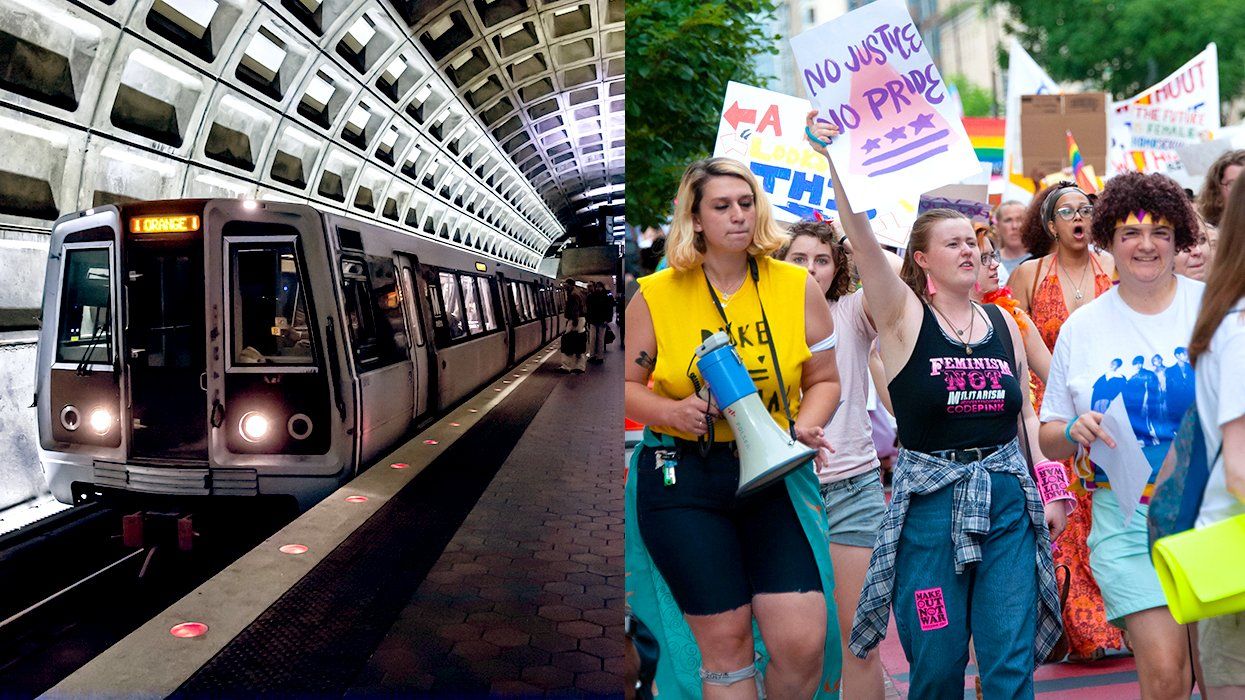Washington, D.C.’s Metro system saw a record-breaking surge in ridership over the weekend, driven by the city’s LGBTQ+ Pride celebrations. More than 650,000 people used Metro Rail and buses on Saturday, marking the highest weekend ridership since the beginning of the COVID-19 pandemic.
Metro Rail alone saw over 418,000 passengers, making it the busiest weekend day since the Nationals baseball team’s World Series parade in 2019, according to a spokesperson for the Washington Metropolitan Area Transit Authority. Metro also recorded the highest ridership for the day of the Capital Pride Parade since 2012, highlighting the significant draw of the LGBTQ+ community’s celebrations.
“We had more than 650,000 trips on bus and rail on Saturday, which is the best weekend ridership day since before the pandemic. It was the best ridership on a Pride parade day since 2012 and 30 percent higher than last year,” a Metro spokesperson told The Advocate. “We had 418,000 rail trips on Saturday, which is the highest Saturday ridership since the Nationals World Series parade on November 2, 2019.”
Metro General Manager Randy Clarke celebrated the busy day on the roads and rails on Sunday.
“Thanks for riding #yourmetro. And great job team on getting all of our customers around on a busy day. @wmata moves this region, especially on special event days!” he wrote on X, formerly Twitter.
The Capital Pride Parade, held on Saturday, drew massive crowds and significant attention. Second Gentleman Douglas Emhoff and nationally acclaimed singers and actors Billy Porter and Keke Palmer were among the prominent figures participating in the festivities. Emhoff, speaking at a press conference at the parade’s starting location, emphasized the importance of the LGBTQ+ rights movement. “It’s great to be here again to enjoy the ambiance and to celebrate with the generations of LGBTQ+ Americans who have fought for their right to live openly and proudly and authentically,” Emhoff said. He noted that he and Vice President Kamala Harris have attended Pride parades nationwide, including in San Francisco and Los Angeles.
According to Metro, the top five special event ridership days on the rail system since 2016 are January 21, 2017, with the Women’s March drawing 1,005,000 riders; June 12, 2018, with the Capitals Stanley Cup Parade drawing 844,000 riders; March 24, 2016, with the peak cherry blossom bloom drawing 766,000 riders; June 7, 2018, with the Capitals winning the Stanley Cup Finals drawing 768,000 riders; and April 3, 2019, with the peak cherry blossom bloom drawing 755,000 riders.
To commemorate Capital Pride month, Metro rolled out special Pride-themed vehicles — a rainbow-wrapped bus and train for a third year. The specially wrapped vehicles will be in service through June 30.
The Pride bus, where Metro employees distribute merchandise such as sweatbands, stickers, bandanas, and flags, was part of the parade.
“Metro is a big part of the community and so is the Capital Pride Parade,” Metro said in a statement. “We get so much joy out of moving hundreds of thousands of people to celebrate Pride Month together. As we said on the side of our special Pride-themed train and bus, Metro is ‘transportation for all.”
The nation’s capital will host World Pride 2025 next summer.





































































Charlie Kirk DID say stoning gay people was the 'perfect law' — and these other heinous quotes